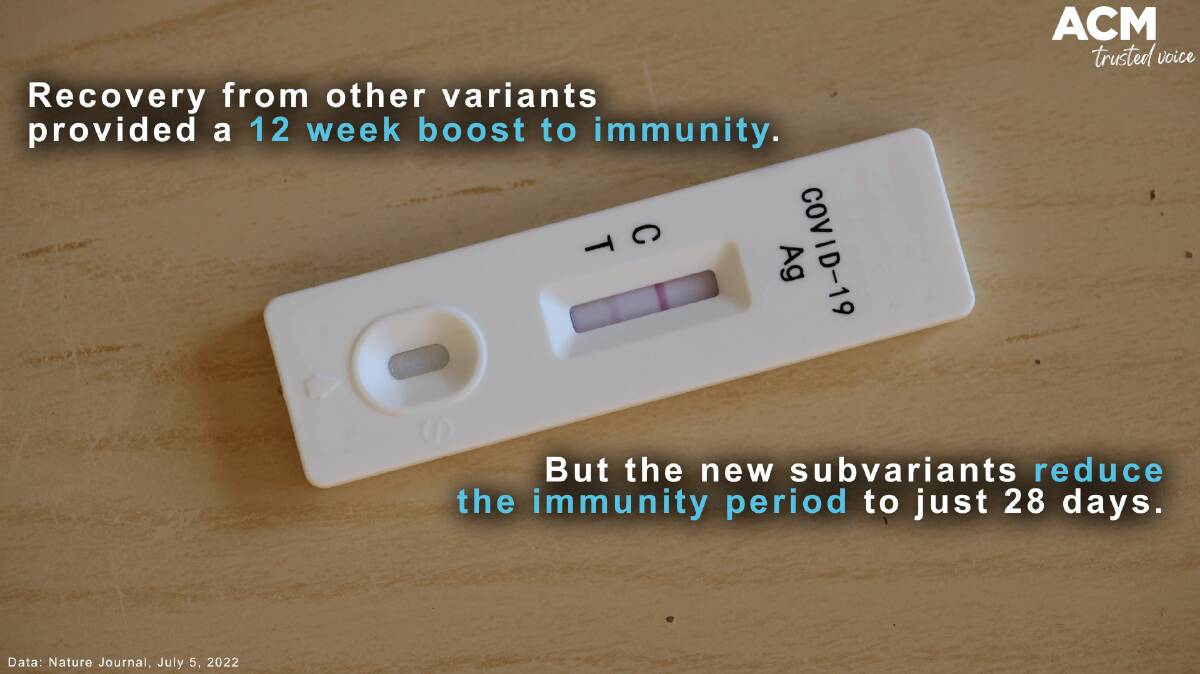Australians with previous COVID-19 immunity have been warned to be on alert again as early research into the virus' latest variants suggests an ability to evade past protections.
Omicron subvariants BA.4 and BA.5 are quickly becoming the most dominant strains of coronavirus in Australia and will likely push the country towards a third Omicron wave.
Their rapid spread has prompted multiple states and territories to reduce their reinfection risk periods from 12 to four weeks.
This means for places including Western Australia, Victoria, NSW and the ACT, residents are required to test and isolate if they develop symptoms again 28 days after recovering from the virus.
Antiviral medications have also been made available to vulnerable Australians who test positive to the virus to prevent them from developing severe disease.
And after a snap national cabinet meeting on July 16, Prime Minister Anthony Albanese reinstated $750 pandemic payments for those without sick leave who are required to isolate due to COVID-19.
Virus' increased ability to reinfect causing concern
The Peter Doherty Institute for Infection and Immunity research officer Ashleigh Porter said it was concerning that the subvariants had an increased ability to infect people even after vaccination or previous COVID-19 infection.
"These subvariants seem to be able to reinfect even after a few weeks of immunity," they said.
"We have a whole susceptible population again, even in really highly vaccinated countries like Australia, which means that [the virus] can spread very rapidly, and that's probably why we've seen so many cases."
In other news:
Dr Porter said states and territories needed to reduce their official reinfection periods to accurately monitor and manage case numbers.
"Reducing this reinfection period has become important with these subvariants because they've shown to infect people within a few weeks of already having a previous COVID-19 infection," they said.
"We don't want to dismiss those cases, we want to include them in our count."

More variants likely to develop
Dr Porter said Omicron's BA.4 and BA.5 sublineages were first detected in South Africa, and stressed it was likely that more mutations would emerge from this virus.
"They [the Omicron subvariants] started spreading in February this year and since then they've spread globally," Dr Porter said.
"Just as the natural part of the SARS-CoV-2 virus' evolution, viruses will continue to accumulate mutations and adapt to their host as part of the natural evolution.
"We'll probably keep seeing new variants, and new lineages of SARS-CoV-2 will [...] keep emerging as it evolves."
Related:
Dr Porter said aside from its ability to evade previous immunity, other features of the subvariants including the severity of disease caused were still unknown.
"BA.4 and BA.5 have a couple of very distinctive mutations in the spike protein," they said.
"Because the spike protein is how the virus attaches to human cells [...] this can have lots of different effects, which is still being explored at the moment."
'If you feel unwell, stay at home'
Dr Porter said among the COVID-safe practices Australians have already adopted in the past few years, the best way to combat the new subvariants was staying up-to-date with vaccinations.
"Things that we can all do would be keeping up with our vaccinations and going to get your booster shot if you're eligible," they said.
"Every booster helps boost our immunity and helps protect us against these new subvariants."
Dr Porter said people should also continue to socially distance and wear fitted masks in shared settings.
"Especially in scenarios where you're indoors and with lots of other people, it's very helpful," they said.
"Most importantly, if you feel unwell, stay at home and take a COVID-19 test if you have one."



